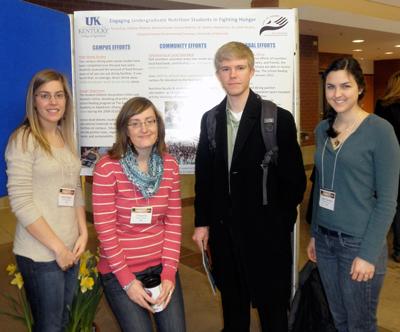Four students from the Student Dietetic Association traveled to the University of Guelph in Ontario, Canada to learn about the multifaceted issue of hunger in the world. Stories, strategies, and multidisciplinary perspectives were shared to inspire and educate administrators, faculty, and students about how they can make a difference in their communities and the world.

Speakers discussed factors that are integrated with hunger, such as sociopolitical instability, climate change, poverty, loss of dignity, dependency on handouts, war, and many more. The Deputy Executive Director of the World Food Program in Rome, Ramiro Lopes da Silva, shared with conference attendees many different approaches that can be taken towards the issue of hunger. He mentioned connecting farmers to markets, protecting the nutritional status' of young children, establishing food reserves, providing school meals, and solidifying partnerships. An example of a "solidified partnership" is with the Campbell Soup Company, which has developed a canned product called Nourish that is nutritionally recognized as a full meal. This product can be put into use worldwide, as it is ethnically versatile and has a shelf life of two years.
Students also learned that to incorporate various entities, such as governments, local communities, universities, farmers, and the media, into the fight against world hunger they should raise awareness on local, political, and corporate levels. To prevent getting overwhelmed, students were encouraged to break the issue down into small, achievable units.
Getting involved locally is an excellent way for students to break down the issue. Serving at the local God's Pantry or soup kitchen, growing a garden, being mindful of sustainability, buying locally grown food, and raising awareness about the hunger issue all help, even if in a small way. As one of the speakers exclaimed, "Several pushes become a shove!"
The SDA hopes to use the information learned at the Annual Summit to continue their hunger efforts and expand these efforts to other organizations within the University of Kentucky by establishing collaborative relationships.
